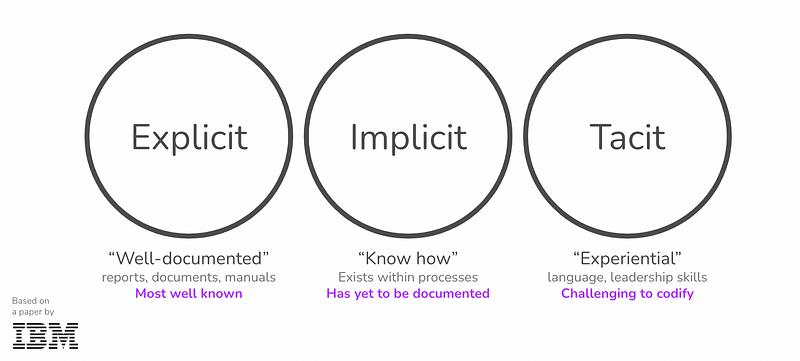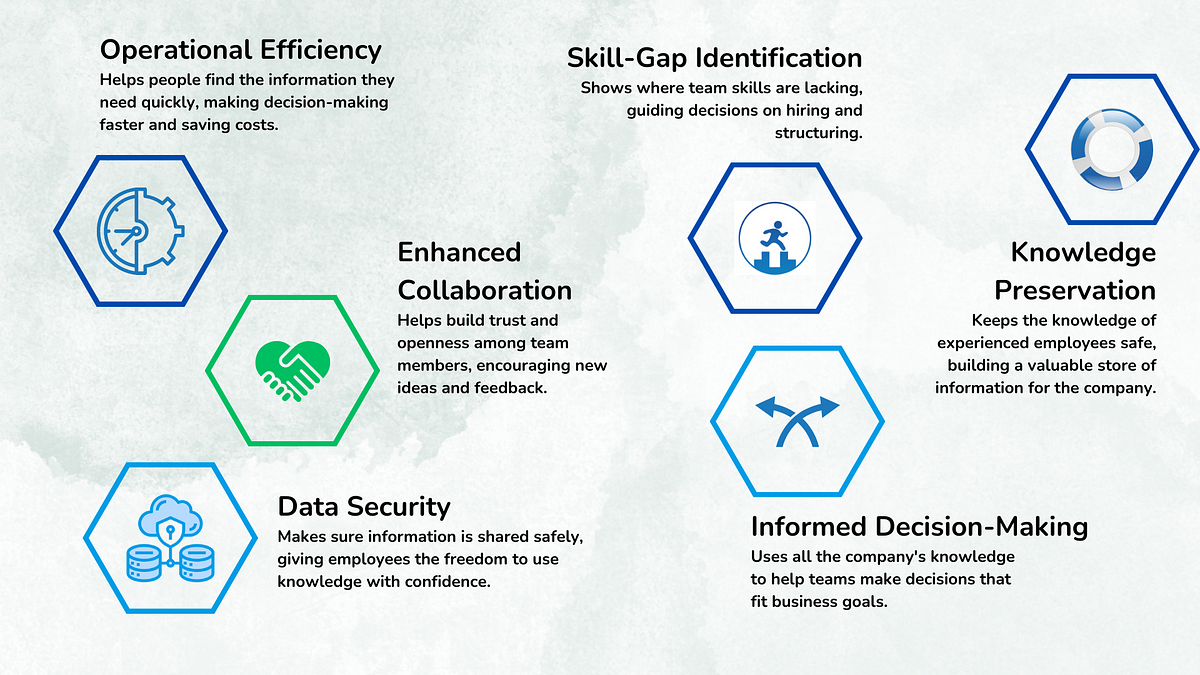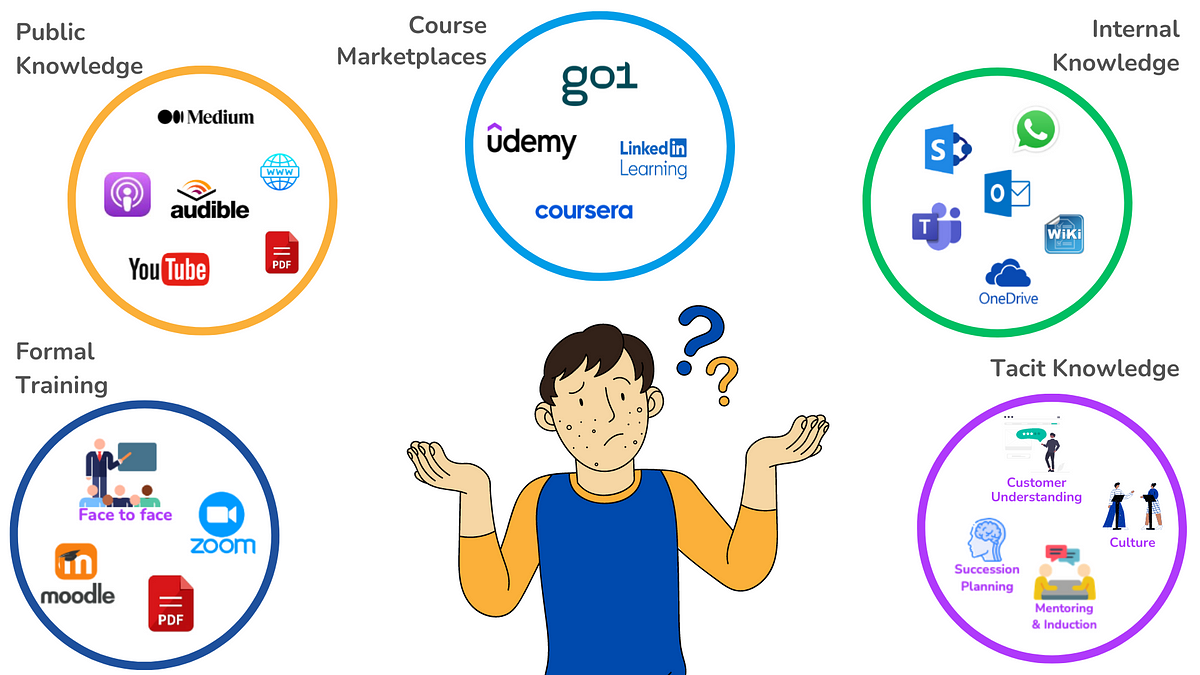Bridging Knowledge Management and Corporate Learning

Bridging Knowledge Management and Corporate Learning
An Organisational Necessity
We’re currently living in what future historians might call ‘The Great Transition’.
It’s a period of profound digital transformation where organisations worldwide learn to harness the true potential of both the data they generate daily — and the waves of technological innovation that break upon their shores with increasing frequency.
Artificial Intelligence may well be as big as — if not bigger than — the internet, and in 2030 (now under six years away) the rate at which workers will be able to turn ideas into reality will be astoundingly rapid, effectively dissolving the borders between concept and creation in many industries.
Picture This
Imagine stepping into your office, not a physical space filled with desks and computers, but a vibrant, digital sphere that pulsates with knowledge.
The air buzzes with ideas, insights, and information, flowing freely without constraint from siloed structures or geographical boundaries.
You and your co-workers are in an environment where the speed of innovation is accelerated, where the seemingly impossible becomes possible in less time than we can presently comprehend.
It’s an exciting — if bewildering — place to be.
Knowledge Management in a Nutshell
Knowledge Management (KM) is the process of creating, sharing, using, and managing an organisation’s knowledge and information — which comes in three forms: tacit (experiential), implicit (‘know-how’), and explicit (well-documented).

As noted by Peter Senge, Systems Scientist and Lecturer at MIT,
“Sharing knowledge is not about giving people something, or getting something from them. That is only valid for information sharing. Sharing knowledge occurs when people are genuinely interested in helping one another develop new capacities for action; it is about creating learning processes.”
KM aims to achieve organisational objectives by making the best use of this knowledge; in other words, it’s about getting the right knowledge to the right person at the right time.
it’s about getting the right knowledge to the right person at the right time.
When done right, KM can make a big difference in how a company works. See below for some of the main benefits, including better decisions, saving time, and stronger teamwork.

The Corporate Classroom of the Future
Traditionally, Corporate Learning (CL) has been confined to training rooms and online courses facilitated by structured Learning Management Systems.
CL has always played a crucial role in employee development and business growth — but the fast-paced and rapidly evolving business landscape of today demands a more progressive approach.
To keep pace with modern demands, CL needs to transcend the conventional ‘classroom’ experience, to become a continuous, dynamic process — and an everyday experience, fueled by multi-source real-time data, and tailored to the specific needs of individuals and the organisation as a whole.

The recent rise of AI models such as ChatGPT will play a pivotal role in realising this vision, enabling adaptive learning experiences that evolve with the needs of the employees and the strategic goals of the business.
Picture Corporate Learning evolving daily, instantly turning fresh data, objectives, and market trends into bite-sized “knowledge nuggets” — now, imagine you could converse with this knowledge, your organisation’s wisdom at your vocal command.
This isn’t the future, it’s here. Let’s talk!
The Perfect Marriage: KM Meets CL
In this brave new world, KM and CL aren’t just siloed functions; they are star-crossed lovers, united by a common goal: to unlock human potential in line with an organisation’s objectives.
In this brave new world, Knowledge Management and Corporate Learning aren’t just siloed functions; they are star-crossed lovers, united by a common goal: to unlock human potential in line with an organisation’s objectives.
Imagine KM as the know-it-all sage, armed with the wisdom of the entire organisation, and CL as the ever-eager student, hungry to learn and grow.
Their union breeds innovation, efficiency, and growth — the ‘kids’ that are running the show in successful organisations.
But this marriage is not merely an operational alignment but rather a cultural paradigm shift within organisations. Instead of perceiving these two aspects as separate entities, we must understand their interplay as an intricate, symbiotic relationship where each reinforces and enhances the other.
When well-integrated, Knowledge Management serves as the enabler for Corporate Learning by providing a well-structured and accessible repository of knowledge. In turn, CL transforms this knowledge into meaningful learning experiences and equips employees with the skills and understanding to effectively apply it in their roles.
The flow of knowledge thus becomes a cyclical, self-enriching process — knowledge informs learning, and learning generates new knowledge.
Wrapping Up: Let’s Paint the Future
As we step into this exciting future, let’s remember that at the heart of it, is the human element.
The goal is not to replace human capacity with artificial intelligence but to leverage AI to augment and enhance our abilities. In the interplay of KM and CL, we are not just making our organisations more efficient; we are nurturing the very essence of our workforce — their curiosity, their creativity, and their potential.
It’s time to take out your ‘paintbrushes’ and start painting this future; build bridges between KM and CL in your organisation, and pave the way for a well-informed, continuously learning, and rapidly innovating workforce.
After all, it’s not just about surviving ‘The Great Transition’; but thriving in it!
Let’s craft a masterpiece of a future for our workplaces, where knowledge isn’t just power; it’s a superpower.
If this vision resonates with you and you are wondering where to begin, I encourage you to reach out directly to us at Beeline. Let’s discuss how we can adapt and grow together in this transformative era. As a special offer for the readers of this article, we’ll provide a free “Strategic KM/CL Alignment Analysis” for your organisation and a discounted 3-month trial for Beeline. Let’s embark on this journey together.

If you like my writing, subscribe to my list to receive occasional emails about whatever I am digging into and feel will be valuable to you creatively :)